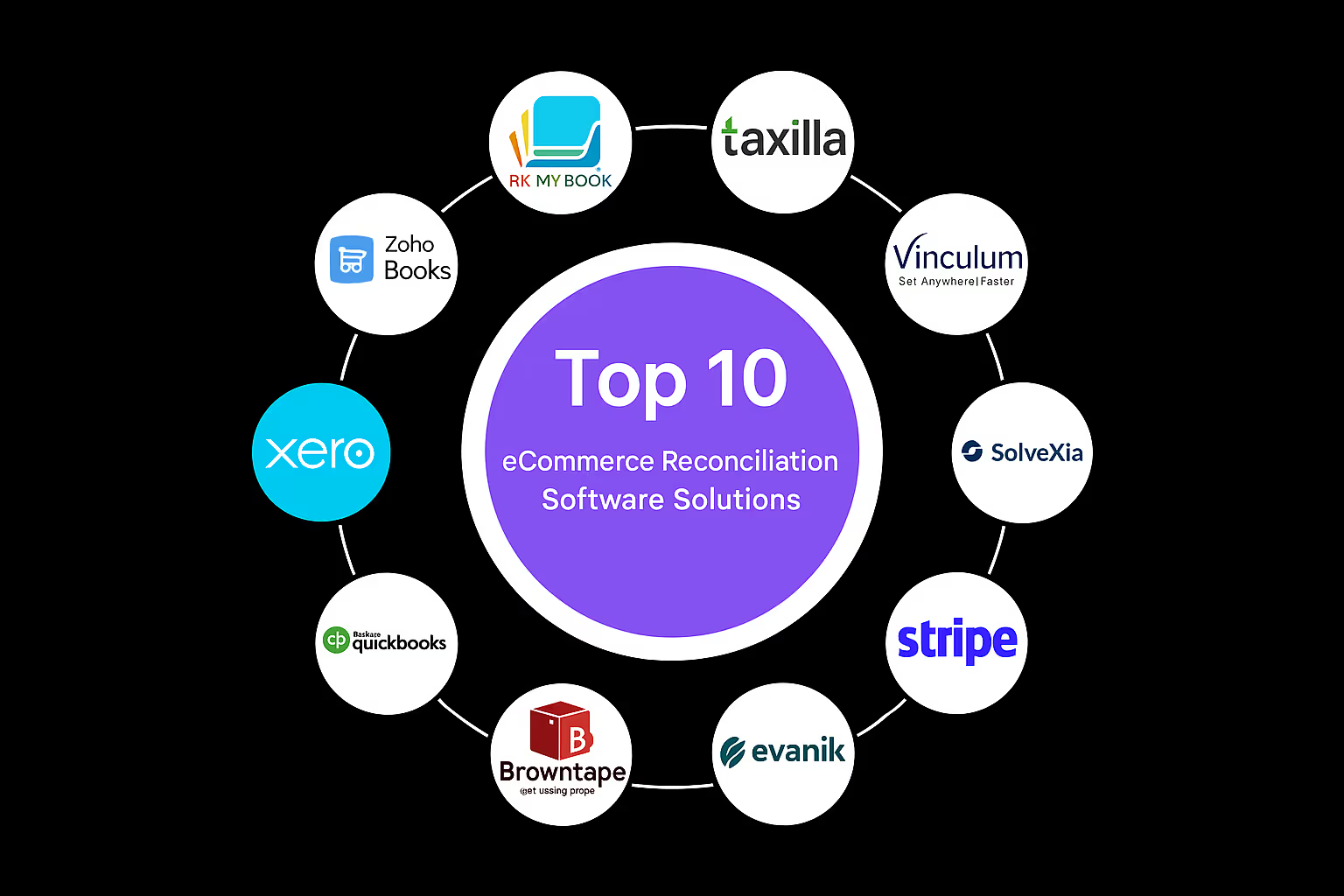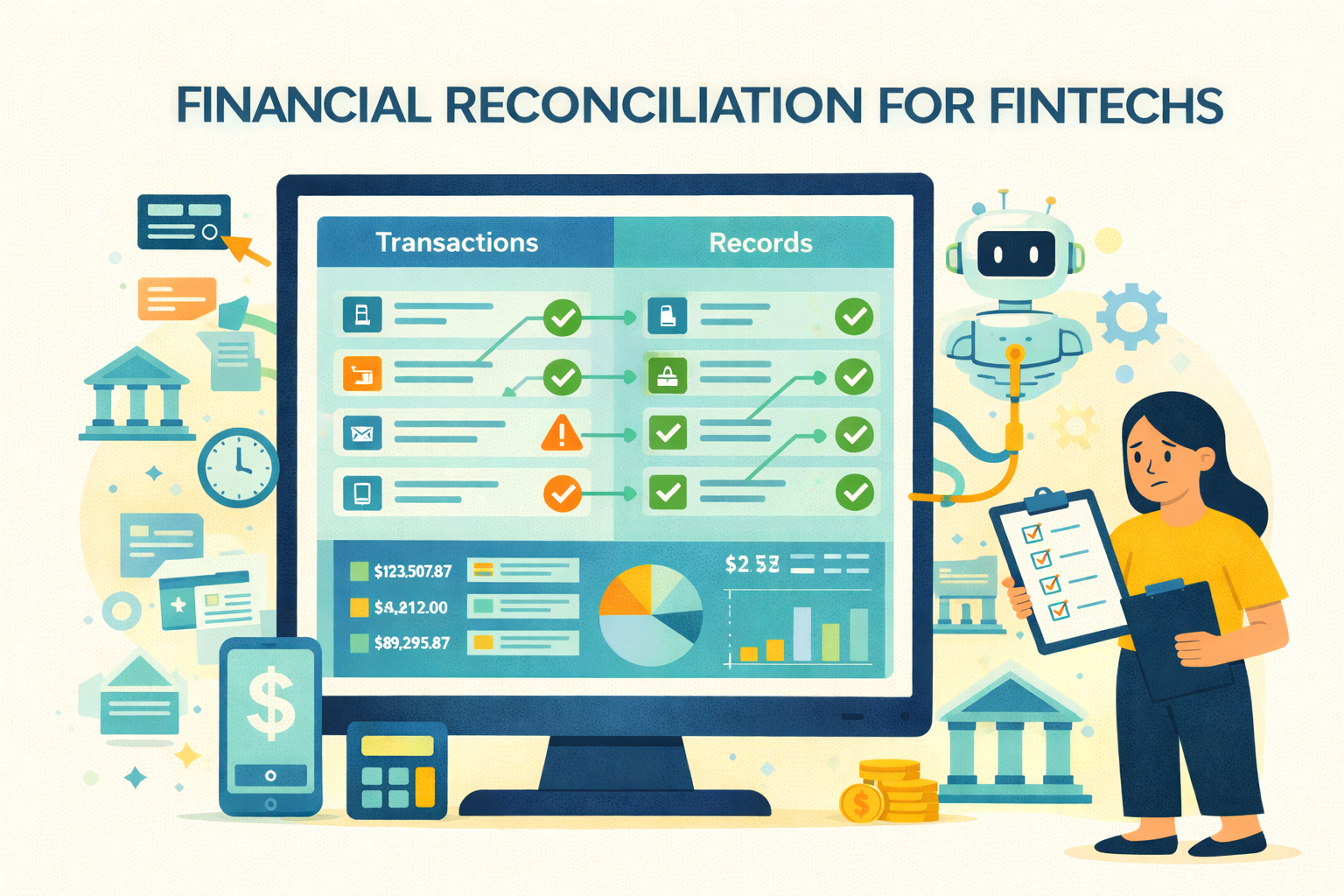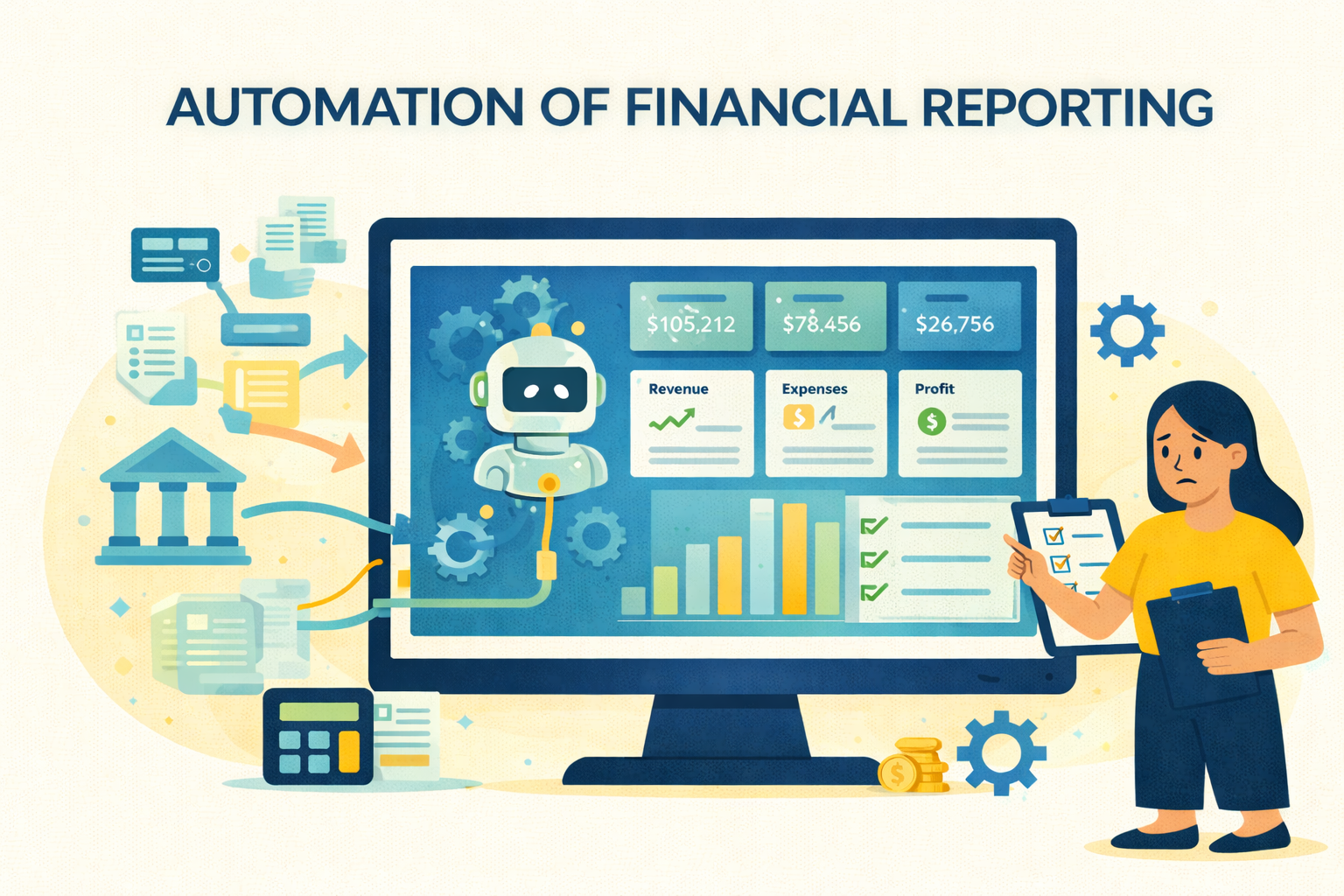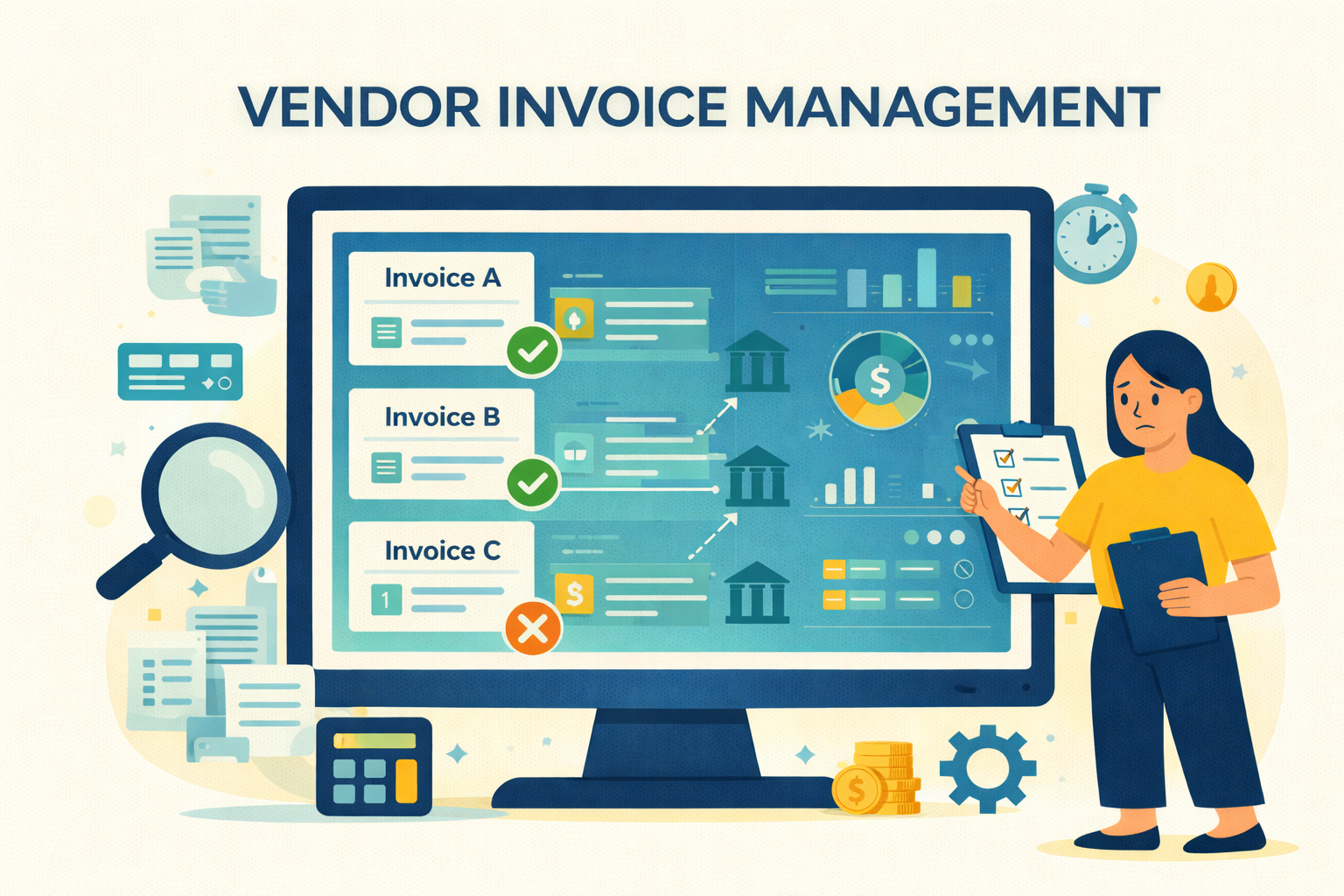Best E-commerce Reconciliation Software (+ Top 10 Tools in 2026)
Today e-commerce businesses face numerous challenges in managing their financial transactions, which span across various payment gateways, payment methods, and currencies. Traditional manual reconciliation procedures waste time and allow human errors to create financial inconsistencies that result in compliance issues and revenue loss.
eCommerce companies today require reconciliation software, which simplifies financial operations processes, enables quick month end closes and generates accurate financial records.
TL;DR
E-commerce reconciliation software automates the matching of orders, payments, fees, refunds, and bank deposits across online sales channels (like Shopify, Amazon, Stripe) with accounting systems to prevent errors, reduce manual effort, and accelerate closes. This guide covers what e-commerce reconciliation software does, key features to look for (data integration, automated matching, exception handling, real-time visibility), and compares top solutions including Osfin.ai, Taxilla, Vinculum, QuickBooks/Xero integrations and others to help e-commerce finance teams manage high-volume, multi-platform transactions efficiently and maintain accurate financial control.
What is eCommerce Reconciliation Software?
The main purpose of eCommerce reconciliation software is to provide automatic transaction matching between entries from the ERP/Order Management System, payment gateways, and bank statements.
The software prevents revenue leakage and ensures financial control by helping companies maintain up-to-date and accurate information, improve operational efficiency and eliminate human errors. They integrate with e-commerce marketplaces like Amazon and Shopify as well as PayPal and accounting tools such as QuickBooks and Xero.
Top 10 best eCommerce Reconciliation Software Solutions

1. Osfin
Osfin is built for e-commerce and fintech teams that deal with complex, high-volume transactions across multiple platforms. Its AI-driven reconciliation engine automates data retrieval, matching, and reporting that transforms hours of manual work into real-time accuracy.
The platform shines when finance needs scale, speed, and control without adding headcount or IT overhead.
- AI-Powered Automation: Osfin uses AI to automate the payment reconciliation process, including data retrieval, standardization, and transaction matching.
- Real-Time Dashboards: It offers access to comprehensive dashboards and reports for clear, actionable insights into your financial data.
- Extensive Integrations: Osfin leverages a low-code platform to enhance data processing with over 170+ integrations, optimizing ingestion and reporting.
- Rapid data computation: Provides lightning-fast data processing from ingestion to matching and output delivery
Key Highlight:
Osfin's primary strength lies in its AI-driven approach to automating payment reconciliation, which significantly enhances accuracy and efficiency.
Pros
- Exceptionally high auto-match accuracy (up to 99%)
- No heavy IT setup or coding required
- Real-time reconciliation and visibility
- Flexible integration ecosystem
Cons
- Currently optimized for e-commerce and fintech; smaller businesses may find it overpowered
- Advanced analytics features may require onboarding support
Use Cases
- Automating reconciliation across multiple marketplaces and gateways
- Accelerating month-end close cycles
- Eliminating manual errors in high-transaction-volume environments
- Creating a single financial source of truth for leadership reporting
Best For
Mid-market and enterprise e-commerce companies managing multiple sales channels, payment gateways, and currencies, particularly those tired of manual matching and disjointed reporting.
Pricing
Custom enterprise pricing is available upon request, with transparent scaling tiers for mid-market to enterprise users.
Ratings
Averaging multiple user ratings from different platforms and internal sources, Osfin gets a rating of 4.8/5. Users highlight automation accuracy, ease of integration, and real-time transparency as key wins.
2. Taxilla
- Compliance Focus: Taxilla emphasizes tax compliance in e-commerce reconciliation solutions for businesses of any size.
- Order Return Matching: It matches order returns with the ledger alongside each transaction to enhance accuracy.
- Automation Features: Taxilla provides essential automation features for e-commerce reconciliation, ensuring unmatched precision.
- Invoice Automation: It automates invoice processing at a high speed, crucial for e-commerce efficiency.
Key Highlight: Taxilla's primary strength is its focus on te-invoice compliance combined with its robust automation features.
3. Vinculum
- Omnichannel Retail Scaling: Vinculum is a powerful tool for e-commerce payments and scaling omnichannel retail operations.
- Extensive Integrations: It integrates with more than 200 systems, ensuring wide compatibility.
- Inventory Management: Vinculum offers real-time inventory control and missing stock monitoring.
- Warehouse Optimization: Its smart warehouse management system enhances order delivery efficiency and reduces shipping costs.
Key Highlight: Vinculum stands out as a comprehensive solution offering not just payment reconciliation but also robust inventory and warehouse management solutions.
4. SolveXia
- Automated Finance Tasks: SolveXia simplifies the automation of finance and accounting tasks, especially those involving spreadsheets.
- Data Accuracy: It improves data accuracy by simplifying preparation and reducing effort.
- System Integration: SolveXia easily integrates with existing systems.
- Reporting Features: It offers visually rich dashboards, up-to-the-minute reports, and diverse reporting options.
SolveXia excels at automating complex finance tasks and providing robust reporting features.
5. Stripe
- Payment Processing Focus: Stripe is primarily a payment processor but includes basic e-commerce reconciliation tools.
- Automated Invoicing: It offers automated invoicing for streamlined financial processes.
- Payment Analytics: Stripe provides analytics for tracking and understanding payment data.
- Workflow Simplification: For businesses already using Stripe, it simplifies reconciliation workflows due to integrated functions.
Key Highlight: Stripe is ideal for businesses already using it for payment processing. To simplify user workflows, it provides integrated, albeit basic, e-commerce reconciliation features within its platform.
6. eVanik
- Indian E-commerce Focus: eVanik is particularly designed for Indian e-commerce sellers.
- Marketplace Support: It provides marketplace support for Amazon and Flipkart.
- Real-time Data Synchronization: The software maintains real-time marketplace data synchronization.
- Financial Reporting: eVanik offers complete financial reporting capabilities to its users.
Key Highlight: eVanik is tailored for the Indian e-commerce market, offering specific support for major Indian marketplaces like Amazon and Flipkart, along with real-time data and comprehensive financial reporting.
7. Browntape
- Multi-Marketplace Reconciliation: Browntape automatically reconciles payments across multiple e-commerce marketplaces.
- Accurate Comparison Reports: It provides accurate comparison reports to assess financial performance.
- Straightforward Dashboards: The software includes straightforward dashboards for easy financial overview and monitoring.
- Simplified Administration: Browntape simplifies the overall administration of financial operations.
Key Highlight: Browntape's biggest advantage is its ability to automatically handle payment reconciliation across multiple marketplaces like Amazon, Flipkart, and eBay, providing comprehensive reports and dashboards for efficient management.
8. QuickBooks
- Order Management: QuickBooks Commerce provides access to order management features.
- Inventory Control: It includes inventory control capabilities seamlessly integrated with the existing QuickBooks accounting platform.
- Multichannel Sales: The platform supports multichannel sales activities for businesses.
- Financial Reporting: QuickBooks offers extensive financial reports, serving small to medium-sized businesses.
Key Highlight: QuickBooks offers a unified solution for multichannel sales and comprehensive financial reporting, particularly beneficial for small to medium-sized businesses.
9. Xero
- Cloud-Based System: Xero offers a cloud-based accounting system.
- Bank Feed Automation: It provides bank feed automation for simplified data entry.
- Invoice Features: Xero supports invoice generation and reconciliation.
- Platform Integration: It integrates with diverse e-commerce platforms and payment gateways, displaying real-time financial data.
Key Highlight: Xero is popular among small companies due to its straightforward design, cloud-based nature, and its ability to grow with the business, providing essential accounting and reconciliation features.
10. Zoho Books
- Automated Workflows: Zoho Books allows businesses to automatically run various workflows.
- Financial Monitoring: It provides tools to monitor finances effectively.
- Account Reconciliation: The software supports comprehensive account reconciliation operations.
- Platform Integration: It seamlessly integrates with different e-commerce platforms, facilitating complete management of financial requirements.
Key Highlight: Zoho Books offers a robust system for financial management, emphasizing automated workflows and deep integration with e-commerce platforms.
E-commerce reconciliation challenges
E-commerce reconciliation challenges refer to the financial bottlenecks that occur when order, payment, and bank data fall out of sync across platforms like Shopify, Stripe, and Amazon.
These mismatches delay month-end closes, blur true revenue, and tie up cash that should be moving. In most cases, the chaos traces back to six silent culprits, namely payout batching that hides real revenue, mismatched IDs across systems, opaque marketplace fees, delayed refunds, shifting FX rates, and missing or late payment data. Together, they distort margins, stall decisions, and make accuracy feel impossible without automation.
1. Payout batching slows closes and muddies revenue.
Payment gateways group dozens of orders, refunds, and fees into a single payout, while accounting systems expect one clean match per transaction. The math never quite lines up. Finance teams spend hours tracing missing cents and split captures just to balance the day.
Reconciliation tools like Osfin use AI engines to standardize and link those fragments automatically, turning batch deposits into clear, order-level truth in minutes instead of days.
2. ID drift breaks data mapping across systems.
The same sale might wear three different names one in the order system, another in the gateway, a third in the bank feed. Prefixes, suffixes, random hashes. Manual matching becomes detective work.
Tools with a low-code mapping layer like Osfin can spot patterns and equivalent records even when identifiers change, reconnecting the dots that human eyes and spreadsheets can’t keep up with.
3. Marketplace fee opacity distorts real margins.
Marketplaces like Amazon and Shopify take their cut through a maze of referral fees, fulfillment adjustments, and rolling holds. The numbers land late and rarely add up cleanly. That murk hides true revenue and inflates reported profit.
To overcome this, reconciliation tools need to dissect each payout into its real parts fees, holds, adjustments and sync them directly to the right accounts, revealing the actual margin hiding under the noise.
4. Refund timing throws off recognized revenue.
Refunds often arrive after a payout or without a corresponding return, stretching the same sale across multiple accounting periods. The books look healthy one week, then suddenly shrink the next.
This can be mitigated by linking refund data from order systems, payment gateways, and banks, matching timing automatically so revenue is recognized once and only once.
5. FX drift erodes margin and confuses tax.
Authorizations and settlements rarely share the same exchange rate. Each small rounding or conversion difference adds up across thousands of transactions. To solve this, normalize these currency movements in real time, aligning authorization and settlement data. If you’re using an automated reconciliation tool, look if it can flag discrepancies before they ripple into tax or reporting errors.
6. Late or missing data events undermine trust.
When webhooks fail or arrive out of order, ledgers go stale and reports lose reliability. Manual checks can’t catch every missing refund or double-posted payout. So we need a continuous ingestion layer that monitors all data flows, flags anomalies instantly, and ensures every event is captured, reconciled, and audit-ready.
Why E-com business require reconciliation software?
E-commerce money moves fast. Too fast, sometimes, for finance to keep up. Payments land in batches, fees get buried, currencies shift midstream. It’s all fine until month-end, when the numbers that “should” match don’t.
Reconciliation automation software isn’t a luxury here, but it’s the only way to make sense of a system that was never designed to agree with itself.
Let’s take a granular look at why most E-commerce businesses absolute need reconciliation software.
1. Faster month-end closes
Every close feels longer than it should, right? You think you’re done, then realize the payout file doesn’t line up with the ERP, and the weekend batch just hit. It’s because of the drag that manual processes create.
Automated reconciliation compresses that chaos into real-time clarity. The difference? Finance gets to review numbers, not hunt them.
2. Clean payout-to-order matching
This one’s the silent killer. Gateways lump hundreds of orders, refunds, and chargebacks into one payout. Banks post a net amount. The order system records gross sales. None of them talk to each other, and simple, small tasks turn into hours of detective work.
Software bridges that mess automatically, linking every order to its payout, every fee to its reason. One truth, finally.
3. Marketplace fee clarity
When reconciliation runs right, marketplaces stop feeling like black boxes. Every referral fee, FBA deduction, and rolling reserve shows up as a clean line item, all visible, categorized, predictable. Under the hood, reconciliation software decomposes marketplace reports, applies consistent rules, and mirrors that structure in the ledger. The end state? Margins that tell the truth the first time.
4. Multi-currency accuracy
In a perfect system, every currency converts consistently, every rate change is tracked, and every FX difference is explained. Reconciliation software handles the mechanics. Behind the scenes it’s aligning authorization and settlement rates, flagging rounding deltas, and recording variance automatically.
5. Data freshness and audit trails
Imagine opening the books and knowing, without doubt, that every event, payout, and refund is already captured. That’s what continuous data freshness feels like. Reconciliation software keeps the feed alive as it keeps ingesting data daily (or hourly), spotting duplicates, and versioning every change. When auditors arrive, nothing needs rebuilding, because the evidence is already living inside the system, tidy and timestamped.
6. One source of financial truth
Reconciliation software serves as the translator that makes all systems speak in the same currency of truth. Once that alignment exists, forecasting becomes sharper, reporting turns faster, and decisions feel grounded again.
How to Choose eCommerce Reconciliation Software
Below are key factors to consider when comparing your options for software that reconciles e-commerce payments:
.avif)
Integration:
Ensure that the software can seamlessly integrate with your current systems, like your e-commerce platform (like Shopify, WooCommerce, or Magento), payment gateways (like Stripe or Razorpay), and accounting software (like QuickBooks or Zoho Books).
Automation:
Look for software that offers end-to-end automation. These tools help in real-time syncing of transaction data, automated matching of invoices with payments, and timely report generation. Automation saves countless hours and minimizes human errors, especially during high-volume sales periods or reconciliation of refunds, chargebacks, and multichannel transactions.
Scalability:
As your business grows, so will the complexity and scope of your transactions. Choose an option that can scale with higher transaction volumes, multiple payment methods, and growth to new marketplaces or regions. Scalable software protects your investment by ensuring you won't outgrow the system too quickly.
User Experience:
The finance team members, regardless of their technical know-how, should be able to navigate the platform without any hassle. A smooth interface with distinct workflows helps mitigate the onboarding timeline and reduce implementation challenges.
Customer Support:
When choosing a vendor, customer support provided by the tool company for addressing technical problems, integration issues, and customer queries is crucial. Check for support channels (email, phone, chat, etc.), support hours (24/7 or business hours), and how quickly they resolve the issues. Buyers should check how the vendor can assist in smooth onboarding and provide ongoing product training after onboarding.
Cost:
Irrespective of the type of pricing method, whether it is subscription-based, usage-based, or a one-time setup payment, ensure that the features compared align with the value expected from each tier. Though the cheapest choice may be compelling, what matters more is the return received on the investment over a period of time. An investment is justifiable for software systems that eliminate manual tasks, avoid sales loss, and provide dependable reports.
Why Osfin.ai stands out among E-commerce reconciliation solutions
Let’s be real, as finance teams, we don’t dream about faster closes. We dream about certainty. We want every cent, every order, every payout visible in one clean, living view.
That’s what Osfin makes possible. It turns the messy web of payment gateways, marketplaces, and bank feeds into a single stream of truth. No more guesswork, no more “we’ll fix it later.” Just data that behaves itself.
And honestly, for teams who’ve spent one too many late nights fixing files that never seem to match, that shift feels almost magical. Because once reconciliation starts running itself, finance stops playing defense and starts leading the business forward.
Here are some reasons that make Osfin a must-have for e-commerce reconciliation.
- AI-powered reconciliation that actually learns your data patterns, quietly matching 99% of transactions so teams can spend time analyzing, not firefighting.
- 170+ low-code integrations that just plug in and work banks, gateways, ERPs, marketplaces all talking to each other without an IT marathon.
- Real-time dashboards that, frankly, make waiting for month-end feel outdated. You can see what’s matched, what’s pending, and what needs a nudge. right now in real time.
- High-speed computation that chews through millions of records in minutes. Long story short, closing the books starts feeling more like checking a dashboard.
- Multi-currency normalization that keeps global margins stable, even when rates shift. Believe it or not, FX variance becomes just another number on a clean report.
- Continuous freshness checks and audit trails that keep every record accounted for, even the ones that arrive late or twice. (Auditors, take note.)
Conclusion
A properly managed and accurate finance system will positively impact any size of e-commerce business. Good reconciliation software like Osfin.ai helps streamline complex tasks, minimize errors, and determine the accurate financial standing of the business. When choosing a solution for your business, be thorough in evaluating it based on your business needs and on what supports your company's growth.
FAQs on E-commerce Reconciliation Softwares
1. What is reconciling e-commerce transactions?
Reconciling e-commerce transactions refers to the automated matching of records of transactions made from various sales and payment channels with entries in the accounting systems.
2. Why do e-commerce businesses need reconciliation?
Reconciliation is essential To determine fraud and missing transactions and identify suspicious activities, verify compliance with prevailing tax regulations and have an informed strategic view of the enterprise.
3. Is it possible for reconciliation software to link with different sales channels?
Most reconciliation software solutions provide links with various sales channels, including Amazon, Shopify, eBay, and payment processors like PayPal and Stripe.
4. Is reconciliation software ideal for smaller e-commerce companies?
Yes, very much so. Numerous reconciliation software tools are available for small businesses. These tools provide options that align with the needs and limitations of the business. Additionally, there are a number of tools to suit the organizations' size and budget.
5. How frequently should e-commerce companies carry out reconciliation?
It is advisable to do monthly reconciliation. However, businesses that experience a high volume of transactions may find weekly or even daily reconciliation beneficial to sustain precision in the financial records.


